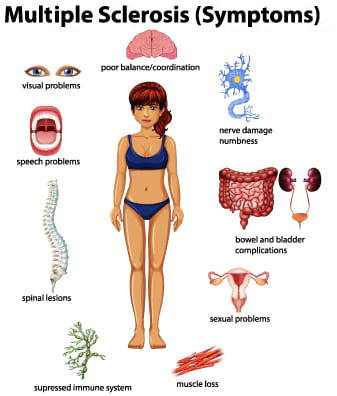Multiple Sclerosis
What Causes MS?
Inflammatory cells cross the blood-brain barrier into the surrounding blood vessels, destroying the myelin and damaging the nerve fibers that it surrounds. Studies show that invading white blood cells play an active role in myelin destruction. In addition, the swelling of specific brain cells end up affecting blood flow, neural activity and advance the disease.
MS Symptoms
- Extreme fatigue
- Visual disturbances
- Altered sensation and difficulties with mobility
- Blurred vision
- Loss of balance
- Poor coordination
- Slurred speech
- Tremors
- Muscle stiffness
- Numbness
- Problems with memory and concentration
- Paralysis
- Blindness.
These symptoms are unpredictable, will vary depending on the person and may come and go or worsen over time. Paralysis is a common symptom of MS, but the disease does not always lead to paralysis. Lastly, motor symptoms are typical with MS, and weakness can affect the legs and sometimes the arms.
MS Symptoms
- Extreme fatigue
- Visual disturbances
- Altered sensation and difficulties with mobility
- Blurred vision
- Loss of balance
- Poor coordination
- Slurred speech
- Tremors
- Muscle stiffness
- Numbness
- Problems with memory and concentration
- Paralysis
- Blindness.
These symptoms are unpredictable and may come and go or worsen over time. They may vary in terms of severity depending on the person.
Although paralysis is a common symptom of MS, the disease does not always lead to paralysis.
Motor symptoms are characteristic of MS, and weakness typically affects the legs and sometimes the arms.
Early Signs of Multiple Sclerosis
Early signs of MS include sensory symptoms, such as tingly feelings, numbness, or feeling like the inside of your leg is unusually cold or filled with ice. A common sensory complaint in MS patients is a rapid electric-like sensation running down the spine and into the limbs. Unfortunately, sensory complaints are quite common in MS patients, with more than 55% of patients reporting them each year. Over the course of the disease, about 70% of those affected with MS will eventually report feeling these symptoms.
Facts about MS
- MS is the most common cause of chronic neurological disability in young adults.
- The onset of MS is typically mild to severe over several days, but it is not usually sudden.
- Most people are diagnosed with MS between the ages of 20 and 50.
- The peak age of onset is 24 years old.
- MS is more common in women.
- Siblings of parents who have MS have a 2.6% greater risk of getting MS.
- The cause of MS is still unknown.
Neurological Aspects of Multiple Sclerosis
The aspects of MS are made up of both cognitive dysfunction and neuropsychiatric disorders. Cognitive problems happen in about 60% of MS patients, and are usually the first symptoms seen. These symptoms can include issues with memory, mental processing, reasoning, verbal fluency, and visuospatial skills like making a bed.
Neuropsychiatric issues mainly consist of mood disorders. Mood disorders are more common in MS than in other chronic disability. They may happen during a relapse of MS or during the progressive course of the disease. Collectively, major depression, bipolar illness, and dysphoria occur in most MS patients, with major depression happening in more than 54%
MS patients may experience a sudden neurologic decline, which can be caused by a rise in body temperature or during exercise. Blurred vision is the most commonly reported passing symptom and is brought on by moderate exercise.
Stages of MS
There are four characteristic clinical courses of MS that describe the stage that an MS patient may currently be in:
- Relapsing-remitting – episodes of severe worsening with periods of recovery and remission between relapses.
- Primary progressive – gradual yet steady neurologic decline from the start of symptoms.
- Secondary progressive – gradual neurologic decline with or without severe relapses in patients who at one time had relapsing-remitting multiple sclerosis.
- Relapsing-progressive – gradual neurologic decline from the start of symptoms, but with overlapping relapses.
What’s Next?
If you are just becoming aware of your MS, you should know that it is common to feel afraid. Hopefully, you have found an understanding neurologist and one who will be concerned with your physical symptoms. However, it is also important to have a neuropsychological work-up as part of your diagnosis as well. This exam will reveal problems with reasoning, memory, and other brain functions—to pinpoint the source(s) of your issues. Once that happens, you will probably feel an overwhelming sense of relief that someone understands what you’ve been going through. This, along with support from doctors, friends, and family, can help to head off many of the difficult psychological responses to MS.
Early diagnosis is important. Thus, with early identification, you gain, to a certain degree, the ability to affect the progress of MS. To a great extent, you will have the tools to be able to cope with it better. Thankfully, with your new understanding, you will be able to handle more and advocate for yourself better. In addition you can help yourself by accepting the nature of your problems, knowing your limitations, and making needed changes at home, school or work.




